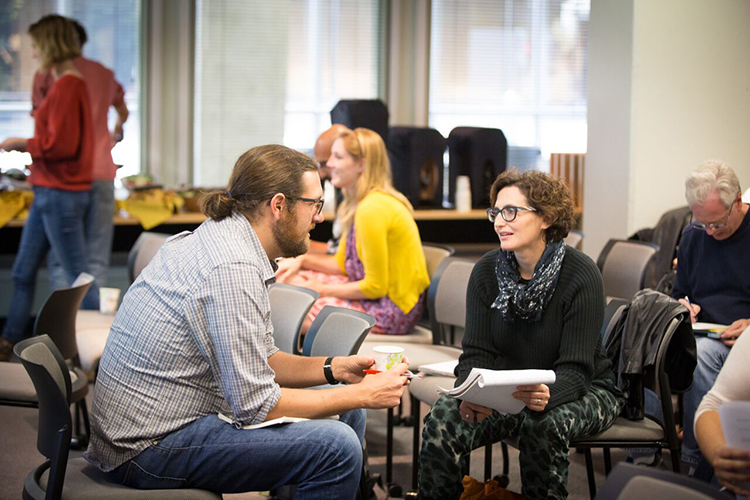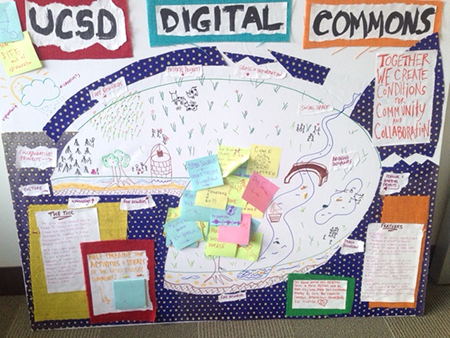
UC San Diego’s KNIT, Digital Arts & Humanities ‘Connect the Dots’
Published Date
By:
- Cynthia Dillon
Share This:
Article Content

Participants discuss scholarly podcasting projects at visiting speaker Chris Gratien's workshop "Podcasting the Humanities," co-sponsored by Middle East Studies, the Institute for Arts and Humanities, and the Library. Photo by Farshid Bazmandegan.
UC San Diego’s KNIT, Digital Arts & Humanities ‘Connect the Dots’
Through an initiative called “KNIT,” the University of California San Diego’s Division of Arts and Humanities is crafting collaboration and community on campus — digitally. By offering online tools collectively referred to as a “digital commons,” KNIT will enable university faculty, students and staff to customize websites for courses, research projects or personal academic portfolios; create or join public and private discussion groups devoted to shared interests; and network with communities both on and off campus. In addition to the KNIT online resource, the division has launched a Digital Arts & Humanities website, featuring initiatives of the Institute of Arts & Humanities (IAH) and related projects and resources on campus.
Resulting from a partnership between the Division of Arts and Humanities, IAH, the Geisel Library and Educational Technology Services, the Digital Arts & Humanities online resource coalesces Dean Cristina Della Coletta’s key priorities for the division and IAH’s foundational themes:
- Emerging Technology in the Arts, asserting that while technology is changing arts-based practices, the arts have a primary place in imagining and shaping our increasingly technologized world,
- Public Arts and Humanities, a special commitment to collaboration with local and regional libraries, museums and community forums, and
- Digital Arts and Humanities, a unique concentration on how new digital tools and technology develop new formats for research, education and university-community connection.
“Digital technology is not simply transforming the ways in which we gather, preserve and disseminate information. It is revolutionizing the very way in which we produce knowledge,” said Della Coletta. “In this sense, technology provides us with the tremendous opportunity of tying knowledge-making with ethics. This commitment to the common good is at the core of humanism, which connects our division’s initiatives while perfectly positioning UC San Diego, a comprehensive university, to create knowledge for the common good.”

An informal poster shows the exciting features of KNIT, a community-oriented digital commons for UC San Diego. Photo courtesy of Erin Glass.
KNIT’s project director and associate director of Digital Arts & Humanities initiatives Erin Glass says “digital arts and humanities” refers to the ways that academics are experimenting with emerging digital technologies for research and teaching, such as computational analysis, augmented reality, digital archives, 3D printing, geographic information systems, multimedia production, and digital publishing and networking tools.
“We’re hoping KNIT will help foster campus community and collaboration by providing spaces for campus members to showcase their activities, share knowledge and network across different departments and institutional spaces,” Glass said. Already, the Science Studies program and the Disability Studies Research Group run blogs on KNIT, and several faculty have used KNIT to set up course blogs for student writing.
Access to KNIT is stretching beyond campus to the San Diego Community College District (SDCCD) as part of the division’s Mellon Foundation-funded “Activating the Humanities in the 21st Century” grant project. KNIT will be used to teach SDCCD transfer students digital-literacy skills as well as offer virtual space for collaboration and connection between SDCCD and UC San Diego. Additionally, Glass and Educational Technology Services are exploring ways of making KNIT a city-wide academic commons by granting access to all higher education institutions in San Diego.
KNIT will be powered by the open-source software Commons in a Box (CBOX), which was developed by academics for the purpose of facilitating digital commons for academic communities. Glass, whose experience includes working with CBOX and diverse academic communities, said she is excited about the potential of open-source technology for higher education as it presents the technical possibility for academic community members to develop the technology — and its governance — according to their particular needs and interests.
“Digital technologies are changing the ways knowledge is produced, shared and accessed, and what interests are served in those processes both within and beyond the university,” Glass noted. “If we want this transformation geared toward social justice, human flourishing and a knowledge culture that serves diverse needs and values, then it’s vital that the arts and humanities participate in reclaiming and reshaping the tools they use to carry out their knowledge-making.”
She cautioned that this does not mean digital methods should replace traditional forms of artistic practice or humanistic inquiry, but rather that the arts and humanities have the unique responsibility of helping shape these emerging technologies for more participatory, democratic and public modes of knowledge production.
“Even the simple use of digital tools to foster community around otherwise traditional academic activities — such as the classroom assignment or the monograph research process — can be a simple, but powerful way in which the arts and humanities might benefit,” Glass added. “In general, my job is to help faculty, students and staff learn more about ways they might implement digital technology into their research and teaching, as well as raise awareness about some of the political, ethical and social issues we face as our world becomes ever-more digitally inflected.”
Over the coming months, Glass will work to showcase different models of digital arts and humanities on campus to help spark student and faculty imaginations about what’s possible. “There are exciting digital arts and humanities activities happening in different spaces on campus, and sometimes I feel all that’s left to do is connect the dots,” she said.
For more information about how you might use KNIT for your research, pedagogy or campus activities, send an email to Erin Glass at .(JavaScript must be enabled to view this email address) or visit knit.ucsd.edu.
The UC San Diego Division of Arts and Humanities, home to IAH, six highly ranked departments and more than 100 programs of study, is ranked #23 in U.S. News & World Report’s 2017 Best Global Universities listing.
Share This:
You May Also Like
Stay in the Know
Keep up with all the latest from UC San Diego. Subscribe to the newsletter today.


